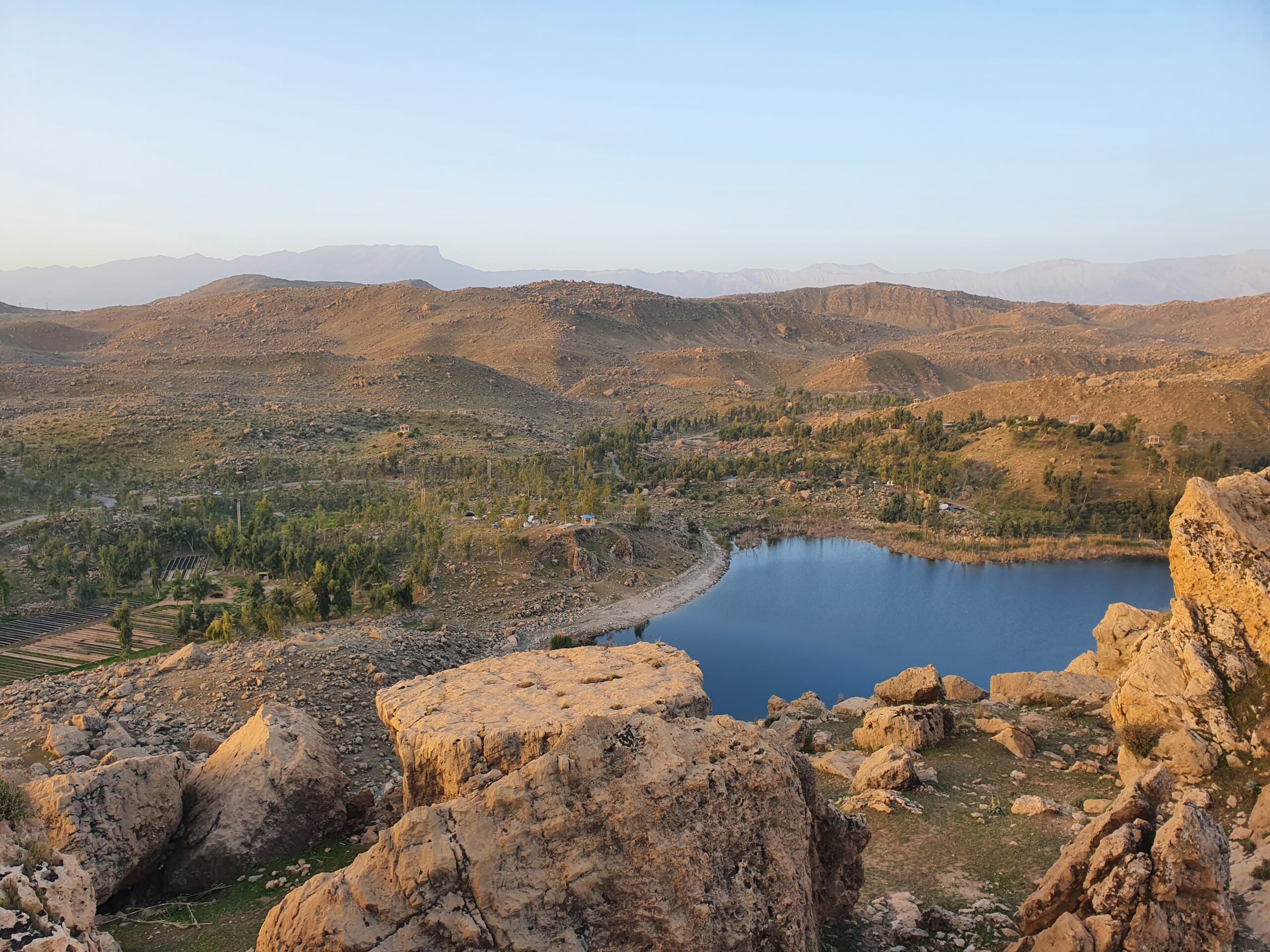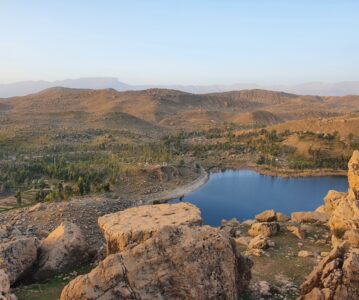We leave the small town of Pol-e Dhoktar behind us and are surprised to see that the valley now gives way to a dry, hilly stone desert. We no longer follow the river Kashkan and therefore have deep expectations when we turn into a small side road to a signposted “Lagoon”. Five minutes later we are delighted and marvel incredulously at the eucalyptus trees that green the large depression. The heart of this wonderful place are two small, reed-framed lakes. We breathe in the scent of eucalyptus and delight in the numerous Iranian families celebrating picnics among the trees and boulders. A great place to spend the night is soon found and we set out to explore. Some of the Iranian picnic groups have settled here for a longer time. They arrived with small trucks that carry all the tents, mats, kitchen utensils and stoves. Wherever we go, we are immediately greeted by joyful shouts of “Hello, where are you from?” followed by energetic invitations to tea, to sit down or to eat. The atmosphere is relaxed and we hear laughter, smell delicious barbecue, the sweet smoke of the water pipes and admire the colorful Iranian unit tents that can be seen everywhere. Finally, we reach the camp of the Razavi clan. This large family has come like many here from Pol-e Dhoktar and spends a whole week together in the Lagoone. Various big tents surround their “territory” and the age of the 45 people ranges from a few weeks to 80 years. What a jubilation, jubilation, jubilation! We are welcomed loudly. The self-appointed spokesman doesn’t miss the opportunity to announce our arrival over a microphone. “I am single,” Amir shouts into the microphone in broken English. “I need Swiss wife!” Laughter erupts. “Mr. Louie,” he announces to the crowd. “Hello Mr. Louie!” A few women take a drag on a hookah, the grandmother presses an impromptu kiss on my cheek, and we continue our tour with the promise to stop by for dinner.
The next family is baking a local specialty on the fire and pushes some of the sweet delicacy into our hands. We chat a bit here too and then stroll on. Next we are invited by an English-speaking engineer and his wife to spend the night in their house in Pol-e Dhoktar. Here it is cold and dangerous at night, he says. But we are not convinced and insist on spending the night in nature.
Since we left Hamedan, people have been telling us to be careful, to take good care of our belongings and to beware of bad people. A phenomenon that always amuses us. The “next” people are bound to be bad people. This game really began in Greece, which without exception had bad things to say about the Turks. In Turkey, it was then the Kurds, or the people in the east, who had to be watched out for. In Georgia the Russians were under suspicion, in Armenia the Azerbaijanis and in Iran soon the Loren or the people in the mountains or… Our experiences show: There is little to be given to such warnings. Everywhere on our route we have met so far kind-hearted, wonderful people, regardless of their origin or cultural background. Only one group of people we personally consider potentially dangerous: Teenage boys with changing voices, and especially teenage boys with changing voices and motorcycles.
We enjoy a quiet moment at our hidden campsite and then embark on the Razavi Clan adventure. In the meantime it is dark and a magnificent starry sky shines above us.
The evening is fun as expected. We are fed and questioned and soon drums and horns are brought out and dust is stirred up in wild circle dances. The men and women dance in separate circles and we are also introduced to the loric dance steps.
For a long time we can still hear the music and shouts from the Razavis, even as we lie in our tent and drift off to sleep.
The next morning the numerous birds wake us up and we soon realize: We want to spend another night and especially the whole day at this special place here. Today is the Siz-Dar-Be-Tar; the 13th day after Nowruz and the Iranians have an evil Jinn (spirit) in their home today, which is best avoided. So, baskets, stoves and children are packed all over the country and people go out into nature for a big picnic. This day marks the end of the two-week vacation and is enjoyed accordingly. The wooded lagoon soon fills with families from near and far and the festival feeling is perfect.
In the afternoon we spend time with the clan once again and this time I sit with a group of women while Louie looks over the shoulders of the men playing cards.
Thanks to the translation app, we are able to converse and I gain some exciting insights into life as a woman in this environment. What is quite clear is that these women are proud of their origins and traditions, even if that means that primarily traditional social patterns prevail. I am surprised to learn that they all normally wear the black tent, the chador, when they go out of the house. Here in the lagoon, the rules are apparently a bit more relaxed and a colorful headscarf will do. While some women wear the chador of their own choice, others think they are told to do so by their brothers and husbands. The latter would otherwise worry about their honor, since Pol-e Dhoktar is a small town. In Tehran, they think, one would not wear a headscarf, and we are already at the next topic: hair colors. “Is that your natural hair color?” one of them asks, pointing incredulously at my light mop of hair. Suddenly, everyone lets their headscarves slip and we admire each other’s hair. “Fake,” someone says, pointing to a cousin’s nose. One after the other, she points to all the noses in the round and, laughing, classifies them as “fake” or “natural.” “Only five million in Pol-e Dhoktar,” is the cost of such an operation. People with plasters on their noses and others with suspiciously straight olfactory organs are a common sight here. The conversation moves to childbearing “in Lorestan: Boy is good!” and marriage age. The youngest married woman in the group is just 16 years old. But others marry significantly later. The brash Safine next to me is already 26, unmarried and asks me to find a man for her in Switzerland. But it should already be the great love. A wonderful quote, which meets with jubilant approval, also comes from her mouth: “We are pennyless but cool,” she types into my cell phone.
Finally, we all move down to the lake, where the men are already splashing around in the amazingly cold water and the women are cooling their toes at most.
Only when we have said goodbye to the clan again and the density of spectators has decreased somewhat, I also dare to jump into the refreshing wet – fully clothed, of course.


